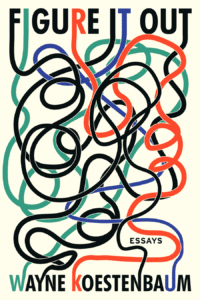Wayne Koestenbaum
Wayne Koestenbaum’s twenty books include Camp Marmalade, Notes on Glaze, The Pink Trance Notebooks, My 1980s & Other Essays, Humiliation, Andy Warhol, Jackie Under My Skin, and The Queen’s Throat, a National Book Critics Circle Award finalist. A new edition of his first novel, Circus; Or, Moira Orfei in Aigues-Mortes, was published in 2019. He is a distinguished professor of English, French, and comparative literature at the CUNY Graduate Center in New York. His website is waynekoestenbaum.com.
Subscribe to our newsletter for news & events from Soft Skull Press.
Books
Figure It Out
Essays
“Whatever his subject―favorites include porn, punctuation and the poetry of Frank O’Hara―the goal is always to jigger logic and language free of its moorings . . . His great and singular appeal is this fealty to his own desire and imagination . . . Figuring it out, after all, is a life sentence." ––Parul Sehgal, The New York Times“Toward what goal do I aspire, ever, but collision? Always accident, concussion, bodies butting together . . . By collision I also mean metaphor and metonymy: operations of slide and slip and transfuse.”
Through a collection of intimate reflections (on art, punctuation, eyeglasses, color, dreams, celebrity, corpses, porn, and translation) and “assignments” that encourage pleasure, attentiveness, and acts of playful making, poet, artist, critic, novelist, and performer Wayne Koestenbaum enacts twenty-six ecstatic collisions between his mind and the world. A subway passenger’s leather bracelet prompts musings on the German word for “stranger”; Montaigne leads to the memory of a fourth-grade friend’s stinky feet. Wayne dreams about a handjob from John Ashbery, swims next to Nicole Kidman, reclaims Robert Rauschenberg’s squeegee, and apotheosizes Marguerite Duras as a destroyer of sentences.
He directly proposes assignments to readers: “Buy a one-dollar cactus, and start anthropomorphizing it. Call it Sabrina.” “Describe an ungenerous or unkind act you have committed.” “Find in every orgasm an encyclopedic richness . . . Reimagine doing the laundry as having an orgasm, and reinterpret orgasm as not a tiny experience, temporally limited, occurring in a single human body, but as an experience that somehow touches on all of human history.”
Figure It Out is both a guidebook for, and the embodiment of, the practices of pleasure, attentiveness, art, and play from “one of the most original and relentlessly obsessed cultural spies writing today” (John Waters).
Circus
or, Moira Orfei in Aigues-Mortes: A Novel
A new edition of a “dazzlingly seductive” fever dream written in “brilliant poetic vernacular” (Bookforum) by a beloved poet and cultural critic, now with an introduction by Rachel Kushner.For five years, concert pianist Theo Mangrove has been living at his family’s home in East Kill, New York, recovering from a nervous breakdown that derailed his career, and attempting to relieve his relentless polysexual appetite in the company of male hustlers, random strangers, music students, his aunt, and occasionally his wife. As he prepares for a comeback recital in Aigues-Mortes, a walled medieval town in southern France, he becomes obsessed with the idea that the Italian circus star Moira Orfei must join him there to perform alongside him.
Extravagantly (and tragicomically) describing his hallucinatory plans in a series of twenty-five notebooks, he assembles an incantatory meditation on performance, failure, fame, decay, and delusion.
"If Debussy and Robert Walser had collaborated on an opera, it would sound like this. --John Ashbery
Catapult | Counterpoint | Soft Skull
1140 Broadway #706
New York, NY 10001
646.926.0805 | contact@softskull.com
1140 Broadway #706
New York, NY 10001
646.926.0805 | contact@softskull.com






